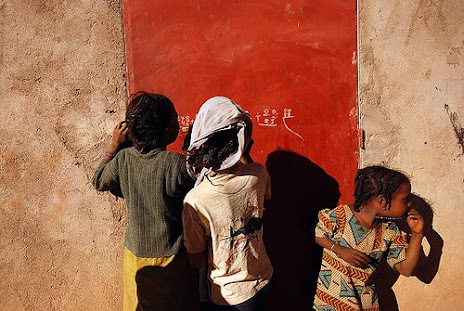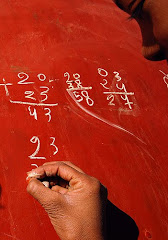Looking to the Future is the summary of Boaler's research on the two schools, Amber Hill and Phoenix Park, where she related the differences in teaching and learning found there. Boaler's book makes a very strong case for the need for reform in mathematics instruction away from the traditional form of instruction (like that received at Amber Hill) toward an inquiry-based, problem-solving approach ( like that at Phoenix Park). Boaler states that remembering facts or procedures for a test does not signify mathematical understanding and we have, over the course of this book, seen that this is true. .
When the students of Amber Hill were asked (in the GCSE's) to apply mathematical knowledge to new situations they were unable to do so. This was largely due to the traditional form of instruction they had received, the cue-based learning they had experienced and a dependence upon the teachers providing additional structure whenever frustration was met in class. We, have as a group of teachers in our class, commented many times on the 'wonderful' experience of realizing students cannot recall concepts you worked on even a short time ago. Teachers have always asked "What's wrong with them[students], we just covered this?". Well, now we know that what's wrong with them is they didn't achieve true understanding. They could memorize steps or repeat examples of something the teacher had just modeled, but as far as really seeing what the mathematics was in a given topic, that was something not achieved by many.
Boaler makes a strong case for the "inherent complexity of the learning process" and for the idea that we cannot see assessment as an indicator only of whether or not "a student has more or less knowledge". Assessment is so much more than that and as a teacher who was already making changes to her assessment style I have been profoundly affected by what I have learned from Boaler's work. I was indeed making changes to assessment but I didn't truly understand the need for it, I didn't have the belief that it would make a difference. Now I know that assessment must be focused on finding out about the different forms of knowledge a student has, the depth of mathematical understanding and reasoning a student develops, the connections they make to the big ideas of mathematics and most importantly assessing how these understanding, reasoning or connections were made.
This chapter made some very interesting conclusions and I was most struck by the following ( this is by no means a total list of the ideas contained within the pages of this chapter):
-Pedagogies matter. Simple statement, profound idea. If nothing else this fact has been hammered home to me during this class, my teaching has been affected for the good by this.
-"if we want student to consider mathematical situations and flexibly make use of mathematics knowledge in the real world or in examinations of higher mathematics, we need to engage students in similar practices in the classroom". As we discussed, I know I have made changes to my teaching style but I don't think I have made the situated learning in my classroom relate to the real world in any worthwhile way. Something to work on!
-'spoon feeding' students is not helpful. This is certainly something we've discussed at length and I am as guilty of it as anyone of doing this. I am more aware now and make a conscious effort not to enforce learned helplessness by becoming a crutch for students. I am more willing to let them 'struggle' and try to find the answer their own way.
-The need for professional development is paramount. I did choose this as my topic of inquiry and I've learned a lot from that research and this book. When Boaler states on p. 182 that " if similar energies [she refers to the lengths( and money)anti-reform lobbiests go through] were spent helping teachers become better prepared then it seems likely that the nations children would be considerable better served". Yes, this is exactly my point, I can't see reform measures in mathematics taking hold in a big way without significantly more support for teachers ( time, money, learning situations).
This study provided many critical issues for mathematics instruction for us to delve into. It was an interesting book and an enjoyable course. I was rather sad to read in the end that political/parental pressure has scuttled the innovative work that was being done at Phoenix Park. I don't believe that throwing money at the problem is going to help improve understanding. Standardized tests scores going up ( which has not been the case) do not mean the children in Britain ( or anywhere) have a better grasp of mathematics. The advantages of the approach taken by Phoenix Park have been substantiated by Boaler's longitudinal study, too bad it seems to be so easily ignored. Nevermind, it has changed at least 8 people we know and that's a start! Thanks to everyone for such an enjoyable semester, good luck with your future studies, thanks to Mary for her help and guidance and Merry Christmas to all!
skip to main |
skip to sidebar


No comments:
Post a Comment